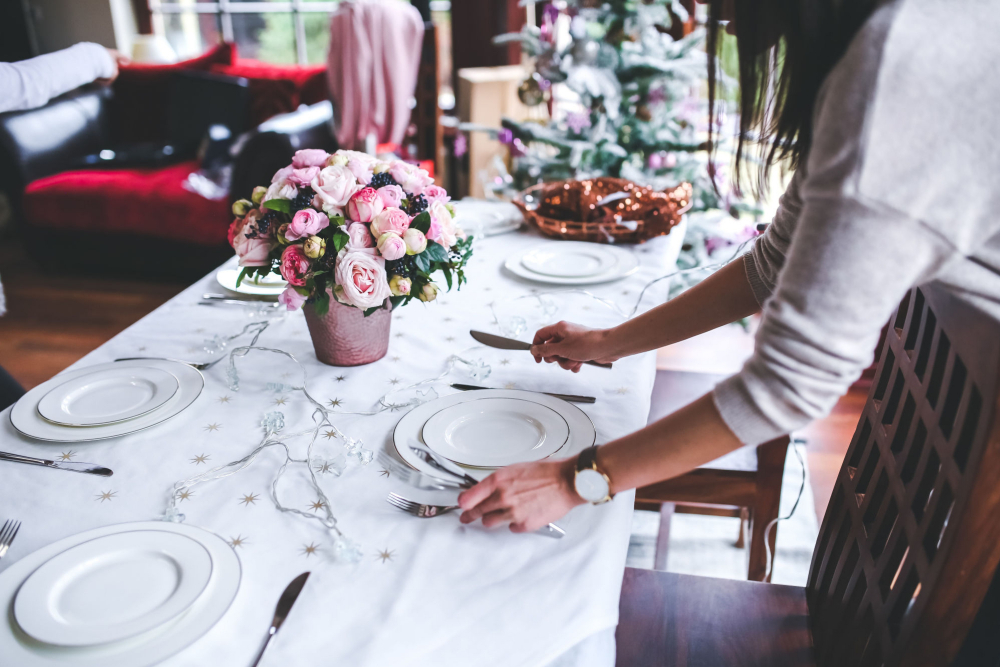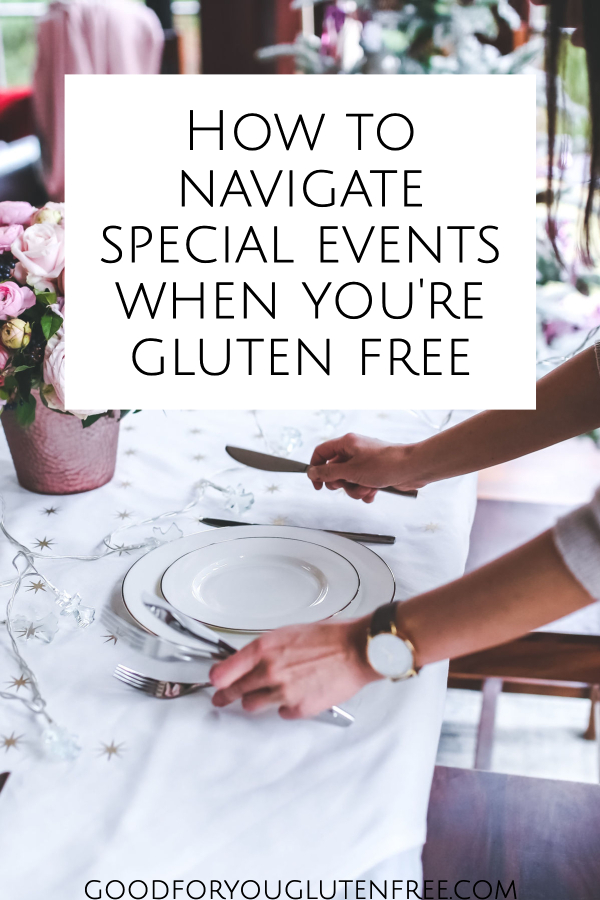
Navigating special events when you’re gluten-free isn’t easy. You have to consider the event, the guests, the hosts, and your personal situation.
Last week, I attended my friend’s son’s Bar Mitzvah in Minneapolis, far from my home in Denver. While I normally stay in a hotel with a kitchen or kitchenette, this time, we just stayed in a low-key hotel room that didn’t have a kitchen. Our reasoning was we were there for only two nights, and we were entertained for most of our meals by our friends.
Of course, I told my friends I ate gluten-free, and they said there would be “options,” but even still, I couldn’t expect them to cater to my every need when they were busy with Bar Mitzvah details.
Unfortunately, I found myself in a tricky situation. There were gluten-free options, but they weren’t quite options safe enough for me to eat and free from potential cross-contamination.
This situation caused me to reflect on what I could have done differently to ensure a safe meal and how you, too, can navigate special events when you eat gluten-free.

Navigating Special Events When You Eat Gluten Free
It’s so fun to get an invitation for a special event… oh, and then you remember you can’t eat gluten, and it will turn into a thing. Right.
That said, you should absolutely enjoy your friend’s celebration, and you should absolutely get a gluten-free meal. Your friend is paying her caterer to feed you. If her caterer cannot accommodate you, why should your friend pay for you to eat something you can’t eat?
Here’s how to approach these tricky situations with confidence and ease to make sure you get a gluten-free meal and your friend feels good about hosting – and celebrating – with you.
(1) Note Special Diet Requests on Return Card
Ideally, the invitation has a place on it where you can state your special dietary requests. I love when invitations include that, and I always include a line that asks, “Any special dietary requests?” when I send out invitations with reply cards.
If the invitation doesn’t invite you to share this information, I suggest you write on the card, “Gluten-free meal, please.”
(2) Follow Up With an Email, Text, or Call
I always write on the invitation and then follow up with an email, text, or call (depending on how close I am to the person) to let them know I got the invitation, I’m excited to celebrate with them, and that I eat gluten-free and was wondering if I could request a gluten-free meal.
This has worked like a charm. My friend wants me to eat. She’s paying for me to eat. And of course, she is willing to talk to her caterer about getting me a safe meal.
(3) Request to Speak to the Caterer
I realize when traveling to my friend’s Bar Mitzvah that I did not fully communicate my request. It’s one thing to request gluten-free options, but another thing to say, “I cannot eat gluten and need a safe meal provided for me. May I speak with your caterer about the menu?”
It’s hard to do this, but it’s a must-do for a safe meal. And there is always a nice way to approach it.
Once you ask your friend if you can get a gluten-free meal, also ask if she can put you in touch with the caterer so you can communicate your needs directly. This gives you a direct line to the caterer and takes the job off your friend’s plate. She is busy planning her event and doesn’t need to be bothered with such details anyway.
The brilliance of this is that you get to talk with the caterer, express the seriousness of your request, discuss menu options, ask for a similar dish to be prepared safely for you, etc. A direct line to the caterer is your best bet for getting a safe meal.
At the Event
Of course, even after all your foolproof measures, things can still go awry. This is why I always do the following in addition to the above pre-planning.
(1) Bring a Little Food
Always have a few protein bars or snacks in your purse or tucked away in your car or jacket, just in case there are no food options for you to eat.
Also, try to eat a little something before you go this way you won’t be hungry and you’ll be way less concerned about food. It’s not ideal, but at least you won’t be hungry if there’s no food for you.
Related Reading: The BEST Gluten-Free Snacks on the Market
(2) Talk to the Chef/Catering Manager
When you arrive at your venue, sneak into the kitchen as early as possible to talk with the chef or catering manager. Hopefully, you have a rapport with him or her already, but if not, this is a good time to explain your dietary needs and ask him or her to walk you through the menu.
If it appears that nothing is safe for you after all, ask if it’s possible to make you something. If there are plated dishes and pasta is on the dish, ask if the chef can make your plate without the pasta, for example.
(3) Be Grateful
If a special meal is provided for you, be sure to thank the hostess and/or caterer. Go out of your way to thank them. Do whatever you can to encourage them to be sensitive and accommodating to their guests with special dietary needs. A little gratefulness goes a long way, and you’ll be paving the way for gluten-free diners after you.
Related Reading: How to Host Your Gluten-Free Friend For Dinner
What About Conferences and Networking Events?
While it can feel a bit uncomfortable to broach the topic at an event where you’re an invited guest, and a meal is provided for you, the story changes when you have to pay to attend a special event.
I recently attended a conference in Denver. I paid the conference fee, which included the event plus all meals.
About four weeks before the event, I called the conference organizer to notify her that I would need special meals for the duration of the three-day weekend. The conference host said she would ensure I had a safe meal at each meal. I paid for the meal just as much as the next person, so I truly believe the hotel should either provide a safe meal for me or reimburse me for the food portion of the event so I can buy something else.
And when I showed up at the conference, plenty of GF options awaited me. Score!
I also request a gluten-free meal when I attend paid networking luncheons. After I sign up for the luncheon (and pay), I then reach out to the event planner to notify him or her of my special meal request. Every single time the event organizer – and caterer – has agreed to provide me with a safe meal.
If they can’t provide me with a safe meal, I ask to be reimbursed for the food portion and advise them that I’ll need to bring my own food. Remember, caterers and restaurants hate when you bring your own food, so I feel they will always find something for you to eat. They want your money, after all.
Thankfully, every single time I’ve asked for a gluten-free meal, I received one. And I have a feeling you will too.
One More Tip
When speaking with the caterer or event host, ask them to make you a similar meal to what is being provided.
For example, if the caterer is serving salmon and pasta, a similar meal should be provided (perhaps salmon with potatoes). If everyone is eating steak, and you get a salad, you will feel out of place.
Your Turn
What strategies do you employ to navigate special events when you can’t eat gluten? Please leave a comment below to share and help others.
Leave a Comment